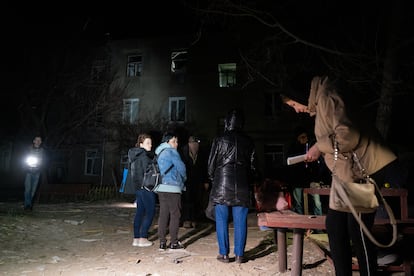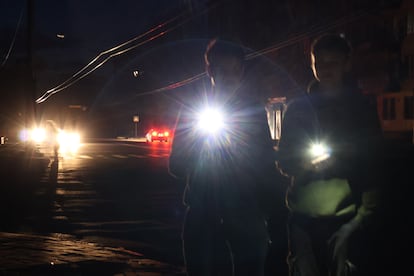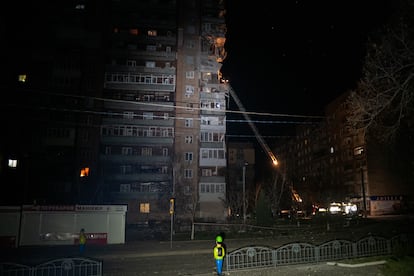Russian attacks leave over a million Kharkiv residents without electricity or water
All power plants and substations in Ukraine’s second largest city have been damaged, but it is now better prepared

Kharkiv’s 1.3 million residents face an average of six hours without electricity daily. Recent attacks by Russia have damaged power plants and substations, leading to widespread power outages and inoperable electric water pumps. Ukraine’s second largest city is bearing the brunt of another Russian assault on the country’s energy sector.
It’s the second Russian campaign targeting the Ukrainian power grid, following a sustained assault from October 2022 to January 2023 that left millions of Ukrainians without essential services for months. This type of bombing, labeled a war crime by the European Commission (EC), led allies to hasten supplying top Western air defense systems to Ukraine, including the American Patriot, the German Iris-T and the Norwegian NASAMS.
Military aid to Ukraine is ebbing, particularly from the United States. President Joe Biden’s $60 billion security aid bill for Kyiv has been stalled for months by House Republican infighting. This has had a visible impact on the battlefield, leading to weaker anti-aircraft capabilities. In 2023, the Ukrainian Air Force intercepted 80% of Russian missiles, but this has dropped to 60% in 2024.

“Give us the damn Patriots,” Ukrainian Foreign Minister Dmitro Kuleba bluntly said in an interview with Politico. “If we had enough air defense systems, namely Patriots, we would be able to protect not only the lives of our people, but also our economy from destruction.” President Volodymyr Zelenskiy also called on the United States to unfreeze the stalled security aid. “The Patriots are needed to defend Kharkiv and Zaporizhzhia. And we need anti-aircraft guns to protect people, infrastructure, homes and dams. Russian missiles haven’t been delayed like our aid packages.”
“Kharkiv doesn’t have the anti-aircraft defenses that Kyiv has,” said Alexei, a mechanic who works near the Zmiivska thermal power plant that was heavily damaged in a March 22 bombing. Kyiv is well-protected, but Kharkiv is vulnerable due to its proximity to Russia: enemy territory is just 40 kilometers away. Anti-aircraft defenses struggle to intercept Russian missiles. But Alexei says they are better prepared compared to the winter of 2022. He now has a diesel generator in the garage to provide power to his apartment.
Veteran military officer Alexander Shilin highlights that in addition to missile defenses, Kharkiv lacks anti-aircraft machine guns to counter enemy drones.
Drone interceptions down
Russia used multiple waves of drones to bomb the city on April 4. At least four drones made it through to city center, causing four deaths and 12 injuries. The attack led to a power outage for 350,000 people throughout the province. Ukraine successfully intercepted 11 of 20 drones — a 50% success rate compared to the country’s usual 90%.
Andrii lives on the city outskirts in a 1970s Soviet apartment block. From 8 am to 4 pm, there’s no electricity, spotty cell service and intermittent water supply. He can’t use the trolley anymore because it’s powered by electricity. On the bright side, Andrii says the city now has more public charging points for phones and computers. At home, he’s prepared with solar-powered lights, rechargeable battery-powered lamps, and a 30-liter water tank for emergencies.
Not everyone feels optimistic. Marina Stoliarchuk is a public official who believes things are worse now than in the previous two years of war. Although the weather is getting better with spring approaching, daily bombings and long power outages have weakened her resolve. Nina Mishina, who lives near the Zmiivska power plant, says that many of her neighbors have once again left the city.
Rumors and propaganda
Other people we talked to said they haven’t seen anyone evacuating the city. Russian propaganda outlets reported a mass exodus from Kharkiv, prompting Mayor Igor Terejov to publicly deny the evacuation rumors on April 1. “In Kharkiv, we have around 1.3 million residents, and neither the army nor us see any reason to evacuate. It’s all part of a Russian psychological operation to scare and stress our people.” EL PAÍS confirmed that the city has not been evacuated.
Kharkiv is swirling with rumors, particularly from Russian sources, about a potential offensive on the city. The bombings of the power grid have heightened paranoia, but neither NATO nor the Armed Forces have spotted Russian troop concentrations signaling a blitz of Kharkiv. Ukraine’s National Security Council refuted the rumors in a statement on March 28. “Russia does not have the resources to launch an offensive on Kharkiv. All their fables about being poised to surround the city are part of a propaganda campaign of fear,” said Andrii Kovalenko, head of the National Security Council’s unit for combating disinformation.

Andrii Yusov, a spokesperson for Defense Ministry intelligence, reiterated on April 3 that rumors of an offensive on Kharkiv is nothing more than Russian psychological warfare. Oleksandr Sirski, commander-in-chief of the Armed Forces, warned in a March 29 interview that a Russian siege of Ukraine’s second-largest city can’t be ruled out, but said it would be a “fatal mistake” for the invaders.
President Zelenskiy said Ukraine responded to the Kremlin’s assault on its power grid by launching drone strikes against 16 Russian oil refineries. Hoping to prevent a global surge in oil prices, the U.S. urged Kyiv to desist. In a recent Washington Post interview, Zelenskiy argued that he could check Russian attacks on Ukraine’s energy grid only by making Russia pay a similar price. “Before they start criticizing, people should visit Kharkiv to see how we survive without electricity or water. Russia only understands force.”
Sign up for our weekly newsletter to get more English-language news coverage from EL PAÍS USA Edition
Tu suscripción se está usando en otro dispositivo
¿Quieres añadir otro usuario a tu suscripción?
Si continúas leyendo en este dispositivo, no se podrá leer en el otro.
FlechaTu suscripción se está usando en otro dispositivo y solo puedes acceder a EL PAÍS desde un dispositivo a la vez.
Si quieres compartir tu cuenta, cambia tu suscripción a la modalidad Premium, así podrás añadir otro usuario. Cada uno accederá con su propia cuenta de email, lo que os permitirá personalizar vuestra experiencia en EL PAÍS.
¿Tienes una suscripción de empresa? Accede aquí para contratar más cuentas.
En el caso de no saber quién está usando tu cuenta, te recomendamos cambiar tu contraseña aquí.
Si decides continuar compartiendo tu cuenta, este mensaje se mostrará en tu dispositivo y en el de la otra persona que está usando tu cuenta de forma indefinida, afectando a tu experiencia de lectura. Puedes consultar aquí los términos y condiciones de la suscripción digital.









































